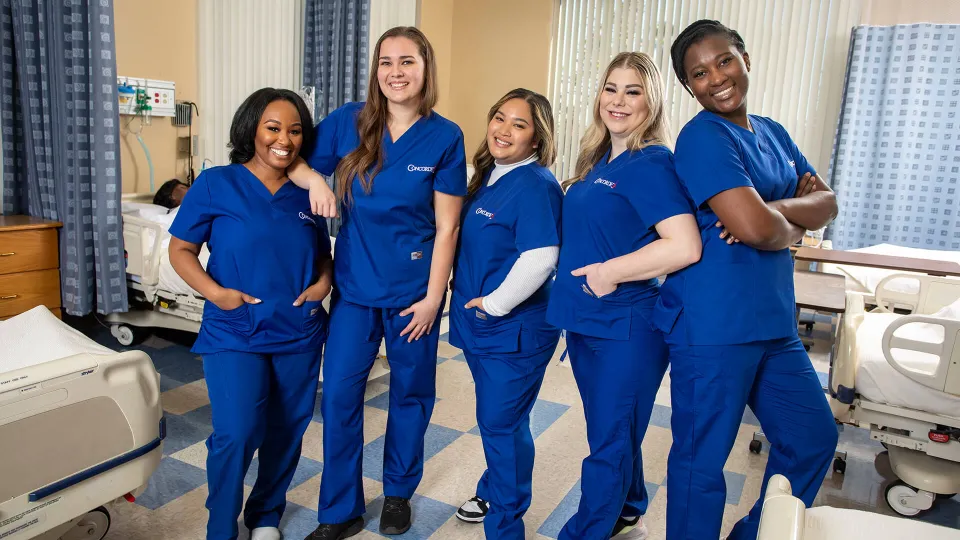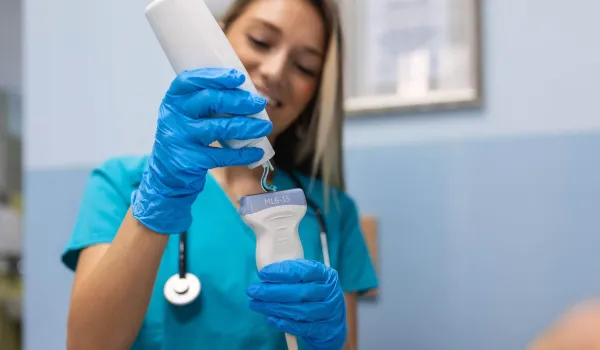
Nursing is a great career for people looking to help others and learn valuable skills. There are several different nursing fields to that match all kinds of skills and interests. Interested candidates should take the time to learn about nursing careers that pique their interest and find out which nursing program to enroll in.
General Types of Nursing Careers
Most nurses need a specific license and degree before they're qualified to work in health care. Some nurses pursue a general nursing career after receiving their certification and degree, while others may earn a certification after specializing in a certain medical subject. General nursing careers include:
Licensed Practical Nurse
A Licensed Practical Nurse, also called an LPN, assists physicians and registered nurses in providing patients with basic care services such as inserting catheters, changing bandages or gauze, and taking their blood pressure. They work closely with patients and their loved ones to ensure they're comfortable and stable.
Some LPNs are trained to work in specialized care facilities, while others are found in settings like clinics, physicians' offices, nursing homes, patient homes, or hospitals. To become a licensed LPN, students must complete a practical nursing program, then pass the National Council Licensure Examination to be qualified to work as an LPN in their state.
Learn more about an LPN vs LVN.
Registered Nurse
Registered nurses (RNs) assist physicians and provide care and necessary treatments to patients with medical conditions or illnesses. Registered nurses can assist in a variety of specialties, industries, and settings, so their job duties may vary depending on where they work. Common responsibilities for Registered nurses include monitoring patients' recovery and progress after treatments, administering medication, and educating patients and their family members on treatment plans and illness prevention.
Registered nurses work in hospitals, nursing care facilities, physicians' offices, or outpatient clinics. Some RNs earn their associate's degree through a pre-licensure nursing program and stick with their current role, while others may pursue a Bachelor of Science in Nursing to advance in their nursing career. To be considered a registered nurse, they must take and pass the NCLEX-RN examination after graduating from their program.
Related: Navigating the Path To Becoming an RN: Educational Pathways and Licensure Requirements
Apply for a nursing program at Concorde today to pursue a diploma, associate, or if you are an RN, consider an online bachelor's degree in nursing.
Location-Based Types of Nursing Careers
Location-based nursing careers focus on the specific location a nurse prefers to work in. Some of these roles take place specifically in a hospital or emergency room setting, while others involve traveling and providing care to patients in different areas. Common location-based nursing careers include:
Emergency Room Nurse
Emergency room (ER) nurses treat patients who have recently undergone an intense injury, trauma, illness, or other medical condition and need immediate treatment. ER nurses are quick problem solvers who must respond immediately to crisis situations and find ways to reduce patients' pain and return them to a stable condition. Other basic responsibilities include drawing blood, cleaning wounds, and ensuring an efficient check-in process for patients.
ER nurses work in hospitals or emergency departments of medical clinics. To become an ER nurse, students must either earn their associate's or bachelor's degree and take the RN licensing exam. Most RNs gain experience by working as a floating nurse in the emergency room at a hospital. This helps them better understand the environment and receive hands-on training in an emergency room setting. Nurses must then complete at least two years working in an emergency room and can become a certified ER nurse after passing the Certified Emergency Nursing Examination.
Public Health Nurse
Public health nurses educate communities on ways to improve their overall health and safety and help community members gain better access to health care. Many public health nurses visit communities to study their health trends and risk factors. They use this information to find ways to reduce and prevent illnesses from forming in that area. Public health nurses also work with local, state, and federal agencies to give rural and low-income communities better access to health care.
Public health nurses usually travel to communities with at-risk populations to educate and provide them with direct health care services. They may go to local schools, senior centers, or community groups to teach others about proper safety practices, diet and nutrition, and other important health care information. Many public health nurses gain initial experience by volunteering with hospice care or community groups. They must receive their associate or bachelor's degree to receive their RN license. They also have the option to earn their Certification in Public Health.
Travel Nurse
Travel nurses are usually short-term employees who provide care to patients in different areas. They're assigned to various care facilities to fill temporary employment gaps. Housing and relocation costs are usually covered by their employer or the staffing agency that recruited them. These nurses can travel domestically or internationally to provide basic nursing services such as assessing and diagnosing illnesses, administering medications, and reviewing diagnostic tests and lab work.
Most travel nurses work with independent staffing agencies that place them in hospitals, clinics, or other care facilities that need extra hands. When the position is filled, the nurse will travel to the next location. Travel nurses should be comfortable with traveling and flexibility, as they regularly move from one location to another. They must have an associate's or bachelor's degree in nursing and an RN license. If a travel nurse has specialty experience, the staffing agency will pair them with a facility that matches their expertise.
Ambulatory Care Nurse
Ambulatory care nurses work in a fast-paced environment providing immediate care to patients. Their tasks often include taking and monitoring vitals, performing phlebotomy procedures, and recommending the best health care services to patients. They help patients manage their pain and try to determine what's harming them. Ambulatory care nurses must be quick problem solvers and think on their feet when deciding on the best way to care for an injured or sick patient.
This role is great for nurses who prefer not to work in a hospital setting since they usually work outside of hospitals in physician's offices or outpatient clinics. They must be licensed RNs and have their associate or bachelor's degree in nursing. After serving as a full-time RN for two years and working in ambulatory care for three years, a nurse can take the Ambulatory Care Nursing Certification Exam.
Specialty Types of Nursing Careers
After a nurse earns their RN certification, they may be interested in working in a certain specialty. Most of these specialties require additional hands-on training and earning a certification in a specific health care subject. Some may decide to work in a specialty clinic working with a specific type of illness or disease, while others may work in a hospital setting treating injuries or disorders focused on a particular part of the body. Common specialty nursing careers include the following:
Aesthetic Nurse
Aesthetic nurses, also known as cosmetic nurses, work mainly on cosmetic procedures. They assist physicians and surgeons in performing a variety of procedures like injections, laser treatments, and skin treatments. An aesthetic nurse monitors the patient during these treatments or procedures to ensure they don't have negative symptoms or reactions.
Aesthetic nurses usually work in medical clinics, outpatient care facilities, private physician's offices, or medical spas. Many employers require an associate's degree in nursing and an RN license. Some may prefer a Bachelor of Science in Nursing as well. Nurses can then receive their Plastic Surgical Nursing Certification if they have at least two years of nursing experience and two years of either plastic surgery, ophthalmology, dermatology, or facial plastic surgery experience after taking their certification exam.
Cardiac Nurse
A cardiac nurse is highly trained in treating cardiovascular issues. They regularly assist a physician in caring for patients with heart-related conditions and educating them and their loved ones on proper at-home care. Cardiac nurses often monitor and treat patients currently suffering from cardiac illnesses. They may also work with rehabilitation patients, instructing them on how to better care for their heart and improve their health. They may provide postoperative care, monitor patients' stress levels, and perform cardiac and vascular readings.
Cardiac nurses work in hospital cardiac units, postoperative facilities, surgical units, and intensive care units. Most Cardiac nurses receive their associate or bachelor's degree in nursing and earn their RN license. They must then continue to serve as a Registered Nurse for two years and work in cardiac nursing within three years. Afterward, they need to take the Cardiac Nursing Examination to receive their cardiac nursing certification.
Critical Care Nurse
A critical care nurse assists and collaborates with doctors, surgeons, and other medical professionals to care for patients with life-threatening and severe illnesses or injuries. Critical care nurses must remain a calm disposition and react quickly to emergency situations in case a patient's condition suddenly changes. Other common responsibilities include cleaning and wrapping wounds, monitoring patients' status with life support equipment, and checking vitals like body temperature, respiratory rate, and heart rate.
Critical care nurses usually work in a hospital in the Intensive Care Unit (ICU). They must have their associate or bachelor's degree and have earned their RN license. Most critical care nurses are expected to earn their training and certification in Advanced Cardiac Life Support. Since some patients in the ICU may be children, these nurses may be expected to receive their certification in Pediatric Advanced Life Support.
Dermatology Nurse
Dermatology nurses work primarily with skin conditions and diseases. They assist physicians in treating patients with skin conditions like cancer, burn wounds, psoriasis, and acne. Dermatology nurses may also assist surgeons in dermatology procedures. Other common duties they complete include monitoring and treating skin wounds, teaching patients how to take care of their skin, and helping physicians perform tests for skin cancer and other dermatology-related health issues.
There are several settings dermatology nurses may work in, including hospitals, clinics, burn units, private practice offices, infusion centers, and plastic surgeon offices. An associate or bachelor's degree may be required for this role along with an RN certification. Many RNs hoping to specialize in dermatology often work for around two years in a dermatology setting before taking the Dermatology Nursing Certification Exam.
Geriatric Nurse
Geriatric nurses work primarily with older patients, providing them with the care needed to maintain mobility and increase their quality of life. They collaborate closely with physicians, social workers, and the patients' families to determine and anticipate the needs of patients. Geriatric nurses provide treatments and recovery programs for age-related health issues like cancer, fall injuries, osteoporosis, chronic pain, arthritis, and impaired mobility. They also provide emotional care to patients dealing with depression or loneliness.
Geriatric nurses can be found in a variety of health care settings, including hospitals, nursing homes, memory care centers, patients' homes, skilled nursing facilities, and retirement centers. Employers typically require an associate degree for geriatric nurses, but some also prefer bachelor's degrees. These nurses must hold and practice with their RN for two years and work for three years in a geriatric setting, then take the exam to receive their Certification in Geriatric Nursing.
Oncology Nurse
Oncology nurses work specifically with patients who have cancer or blood disorders. They communicate with a wide variety of patients, which might include those who are incredibly ill or patients who are stable and recovering. Oncology nurses often administer chemotherapy to patients and must walk them through the entire process. They sometimes serve as emotional support for patients undergoing this treatment. They may also assess patients who finished chemo treatments to determine any complications or symptoms. Oncology nurses work closely with patients and family members to teach them how to take certain medications and handle treatments.
Oncology nurses may work in a variety of locations like general hospitals, specialty hospitals, ambulatory care centers, patient homes, or medical offices. Most oncology nurses have a Bachelor of Science in Nursing, while others have associate's degrees. After they work in an oncology setting for 2000 hours and have served as a registered nurse for 24 months, they're eligible to take the Oncology Certified Nurse Exam.
"NCLEX & Other Exams," 2020 National Council of State Boards of Nursing, Inc, https://www.ncsbn.org/nclex.htm
"The Certification Process," 2020 Board of Certification for Emergency Nursing, https://bcen.org/cen/the-certification-process/
"CPH Eligibility Requirements," Council on Education for Public Health (CEPH), https://www.nbphe.org/eligibility/
"Ambulatory Care Nursing Certification," American Academy of Ambulatory Care Nursing, https://www.aaacn.org/certification/ambulatory-care-nursing-certification
"Get Certified: CPSN," Plastic Surgical Nursing Certification Board, https://psncb.org/CPSN/
"Cardiac Vascular Nursing Certification," American Nurses Association, https://www.nursingworld.org/our-certifications/cardiac-vascular-nurse/
"Advanced Cardiovascular Life Support," American Heart Association, https://cpr.heart.org/en/cpr-courses-and-kits/healthcare-professional/acls
"Dermatology Nursing Certification Board," Dermatology Nurses' Association, >https://www.dnanurse.org/certification/
Gerontological Nursing Certification (RN-BC) | ANCC. ANA. Published 2019. https://www.nursingworld.org/our-certifications/gerontological-nurse/
"Oncology Certified Nurse," Oncology Nursing Certification Corporation, https://www.oncc.org/oncology-certified-nurse-ocn
Take The Next Step Towards a Brighter Future
Interested in learning more about our Nursing (Pre-Licensure) program?
We have a Concorde representative ready to talk about what matters most to you. Get answers about start dates, curriculum, financial aid, scholarships and more!







